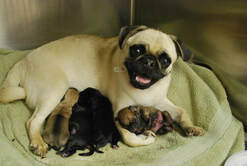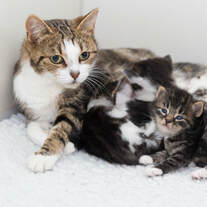Here are the answers to the most frequently asked questions.
Dogs
The gestation period is 58-68 days; avg. is 63 days or roughly 9 weeks.
We can ultrasound to confirm pregnancy 23- 30 after breeding.
An X-ray can be done around day 50 or later to get a count of how many to expect.
We recommend an increase in food during the gestation followed by a slow transition to puppy food in the last few weeks of the pregnancy and while the dog is nursing puppies.
Prepare a whelping box or area to introduce the animal to during the last 3 weeks so that she is comfortable in the space. Most dogs will began to display nesting behavior in the last couple of week before giving birth.
The easiest way to know that your dog is about to whelp is to start taking a temperature twice a day for the last 1-2 weeks of the pregnancy to get a baseline. The temperature will drop by 1 to 2 degrees about 18 hours before labor.
When active labor goes smoothly, it should all be over in a few hours. We recommend that if everything is going well the best thing to do is to stay back and let her do what comes naturally.
You may help if it appears that she is not licking the sack off by tearing the sack and gently but vigorously rubbing the puppy with a warm and dry towel. You may also suction-bulb the fluid from the nose and mouth of the pup, and then return the puppy to the mother.
SIGNS THAT SOMETHING IS WRONG AND YOU NEED TO CALL A VET.
- A drop in body temperature followed by a rise again with no puppies
- Green discharge before the birth of the 1st puppy or with any puppy
- Visible contractions for more than a half an hour without the birth of a puppy
- More than 2 to 4 hours between puppies
- Increase in the amount of bloody discharge that doesn't stop
If you have any questions be sure to call your veterinarian.
Cats
The gestation period is 60-69 days or roughly 9 weeks.
You can tell that your cat is pregnant by an abrupt ending to the heat cycle.
The shape and color of the nipples changes: swelling and change to a dark pink
At about week 5, her abdomen will start to bulge.
Cats will also become more affectionate towards their owners.
In the last few days of the pregnancy the cat will begin to "nest' in a quiet area of the house.
Very few cats have any problems while giving birth; it is best to leave them alone and just check that things are progressing so as not to stress the cat out.
Be sure to feed your cat a nice balanced food through out the gestation period. Increase the amount as she gets closer to birth and after to help with milk production. They need lots of protein and the right minerals.
SIGNS THAT SOMETHING IS WRONG AND YOU NEED TO CALL A VET.
- A drop in body temperature that then rises again with no kittens
- Green discharge before the birth of the 1st kitten or with any kitten
- Visible contractions for more than a half an hour without the birth of a kitten
- More than 2 to 4 hours between kittens
- Increase in the amount of bloody discharge that doesn't stop
If you have any questions be sure to call your veterinarian.


 RSS Feed
RSS Feed
